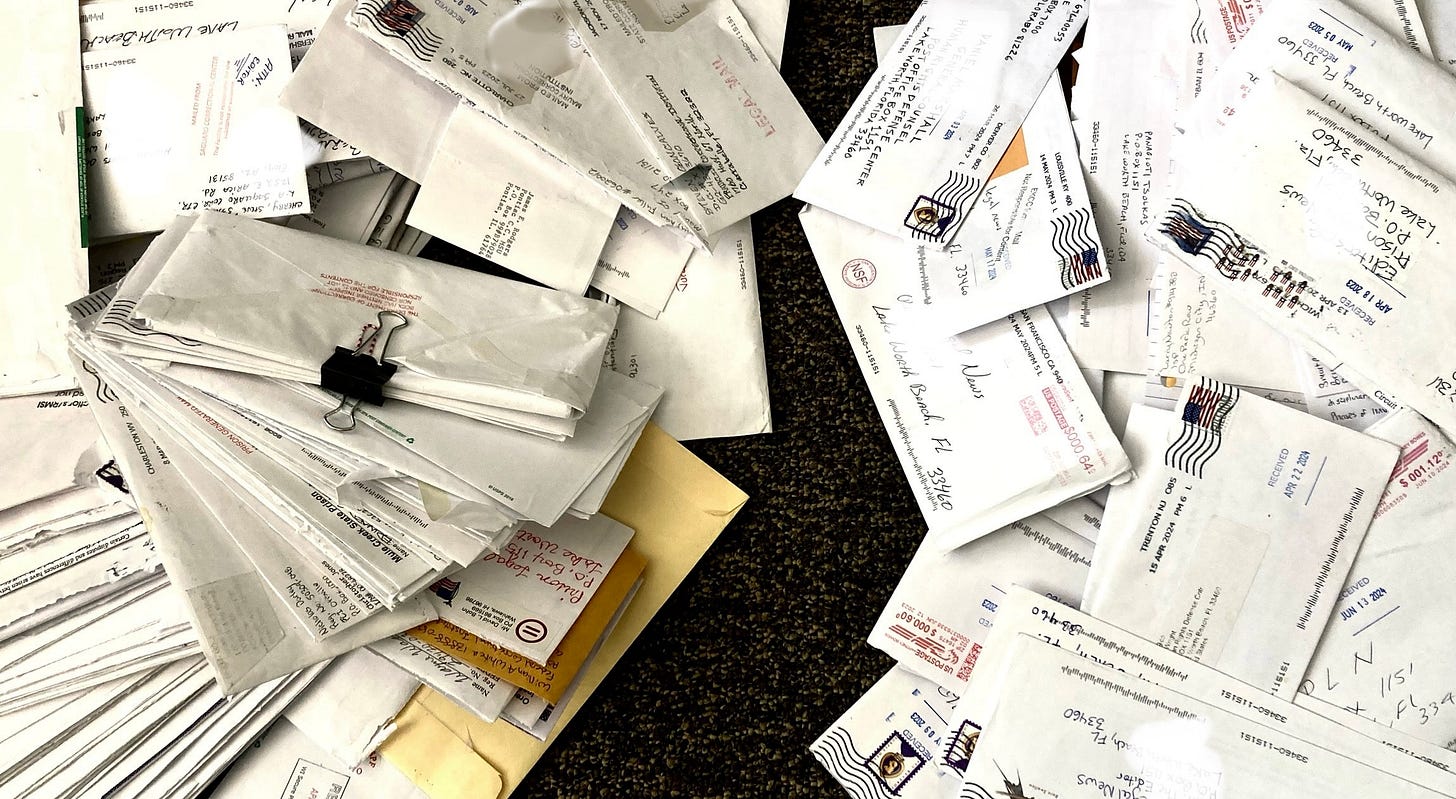Reading Prison Mail
A Glimpse into Another World
I was recently hired to be the assistant editor for Criminal Legal News and for Prison Legal News, both projects of the Human Rights Defense Campaign, which is a prominent national prisoner advocacy nonprofit.
Each periodical has its own a rather unique focus: CLN is essentially a law review of criminal appeals and federal/state court decisions which impact criminal defendants, and PLN covers the lives and concerns of prisoners, including parolees and registry inhabitants and felons who have been released and are no longer under supervision.
It’s a bleak and strange world (which I’ve long been interested in). I’ve always had the sense that there are innumerable paths through life. Most people take familiar courses: they go to college or join the military or take a sales job and try to find an attractive and not-too dysfunctional mate and accumulate property and status. There are other, less crowded, paths though, and I’ve always been fascinated by them. George Orwell (Eric Blair) is, essentially, my model for living. He was (like me) board abroad. He was (like me) deeply concerned with issues of freedom and political organization, and with the craft of writing, throughout his life. He moved often (as have I) and we’ve both made a point to reside in poor and working-class areas, both out of curiosity and necessity (for him it was the garrets of Paris and rooming houses in English coal country-I lived in Washington Heights and Harlem, NY for many years). We’ve both spent long periods indigent, content to write and travel. We both volunteered to fight as infantrymen (Orwell in the Spanish Civil War and me in Operation Enduring Freedom, Afghanistan 2008-2009). The similarities profuse further… but my kinship with Orwell comes from a sense that he was restless and curious and willing to use his very life as a running experiment to explore different ways of living and thinking. It is something I try to emulate.
Years ago, after I’d found recovery programs, but before I’d achieved prolonged sobriety, I became fascinated with the French Foreign Legion. Perhaps I could join, I thought, and serve in some outpost in French Guyana or run patrols in Chad. Or maybe I could be an English teacher abroad? I did neither (COVID interfered, or I may well have left) and instead I stayed where I was and worked to improve my outlook. I remain deeply interested in people who pursue adventure and nonconformal lifestyles though: Sam Harris and his 11-year (!!!) sojourn in India and Nepal; American volunteers in Ukraine; Johann Kastenberger, a serial Austrian bank robber and record-setting marathon runner who robbed (at least) 9 banks; Jocko Willink, a former SEAL commander and author and podcast host who reflects upon achievement and discipline and masculinity.
These are essentially masculine archetypes, in my opinion. We have a culture which tries to impress upon us the sense that men and women are qualitatively similar but I see a much bigger propensity to take risks and follow adventures and dedicate oneself to obsessions and explore among men. This is reflected in social science data and it’s exactly what you’d expect from surveying the history of our species. Women are a precious reproductive resource and nature is therefore more careful with their lives, clustering their intelligences closer to the midline and making them less inclined to pursue risky or unusual pursuits. This isn’t settled science, of course, but it’s certainly a possibility and it should be a topic for discussion. Adding the greater male propensity for physical achievement and risk-taking and status-seeking and competitiveness and travelling and aggression (which are all settled facts) creates a very interesting picture. These are the things I consider as I read prisoner mail.
The view from my desk
Part of my role involves corresponding with contributors (some of whom are free but most imprisoned). My predecessor was not an editor or a writer and seemed to function more as an office assistant. I deeply enjoy corresponding with people (and am mindful that my saved outgoing and incoming letters could be fruitful sources for writing material in the future) and have been happily mailing 2-5 letters each day, all to various state and federal prisons. I arrived at the job to find several boxes and drawers with approximately 2,000 letters from the past few years, all opened but few answered or processed in any meaningful way. Mail from 2022 is defunct and topically obsolete, in my estimation, but anything from 2023 or 2024 gets a careful reading. I have a growing queue of about thirty individuals to whom I will send letters this week.
There are a few immediate impressions one gets from prison mail. One is the absolute poverty and pettiness of these men’s lives. Losing access to a tablet or experiencing a slight decrease in dietary quality or shower privileges is as devastating as a serious fight or a car accident would be to you or I.
There are the expected references to gangs and stabbings and special housing units (SHU’s) and CO (correctional officer) corruption. These are the fearful aspects of the experience to many outsiders, but they are vastly eclipsed by the feeling of boredom and degradation and powerlessness. The aspects of unsafety and squalor aren’t necessarily caused by the institution-the buildings and guards and rules-but are emergent properties, arising out of a network of thousands of restricted and meaningless lives lived in the company of society’s most anti-social and disordered and predatory individuals. Prison is a violent place because it’s full of psychopaths… but it’s also violent because it contains large groups of profoundly bored and benumbed men.
There’s a wide range of attitudes and personalities and intelligences on display as well. Most prisoners are clumsy writers and probably not intelligent, but there’s a substantial number who are verbose and engaged and curious. It will be interesting to correspond with them in the coming months. The sharpest (and probably most consequential) divide that I can discern is similar to a split which I find in rehab patients (whom I visit and speak to regularly as an unconnected, personal activity) and, indeed, in people in society: a sense of accountability versus its absence. Some writers name their crimes and take ownership of their decisions, some seem dedicated to a perspective of victimization and a list of grievances. There are people who focus on who they’ve been wronged and who try to portray themselves as sympathetic and powerless (and virtuous) and there are people who try to maximize their feeling and perception of agency and responsibility. It’s pretty much one or the other, and knowing which it is tells you volumes about the type of person you’re interacting with. I suspect that it might tell you a good idea about what their future will hold as well.
There’s a strong (and rarely considered) image of a system which is profiting massively from these men and their families. Many prisoners work jobs, at a steeply discounted wage, of course. Everyone knows this, and most agree it’s a good thing. There’s some debate as to whether prison labor should be compensated better, however. Would this address recidivism? Would having $3,000 available upon release reduce re-offense? In most cases I suspect that it would not (American crime is usually a matter of impulsiveness and anti-social habits-and not financial need-in my opinion) but it’s one of the issues I’m curious about. Prisoners are (intentionally) the poorest and most marginalized members of our society and the old regime of letters and collect calls still applies but there’s now a massive and parasitic complex of service providers: JPay, Corrlinks, Securus, etc. These companies provide communications to the outside via prison-assigned tablets or public kiosks (from what I gather). It’s obviously a boon to the inmates but users must pay for the privilege, and so must their families. There’s also a network of telecommunications contractors and debit card providers who often extract heavy sums from users, sometimes on both ends. While services must be paid for by somebody of course, these (mostly) men have no ability to shop around or compare prices. Nor do their families. These systems are the strictest kind of monopoly, and the prison is similar to the company towns of the 19th century. In many cases the cash seized from suspects is transferred onto debit cards and then released in that form… minus a 20% user charge. Examples like this abound.
There’s one stark and somewhat surprising fact: none of these letters mention any social justice causes or use any of the language of Critical Theory which has so saturated much of our society. This tells me that a few things are probably true:
These kinds of concepts are luxuries of the rich and the comfortable-they’re irrelevant and silly to people experiencing real systemic oppression.
These kinds of concepts began, spread, and remain in the universities. Where some social circle or institution overlaps or intersects with universities you will find it. Where it doesn’t you won’t.
Believers in these concepts are fundamentally insincere. If the marginalized were really their object they would be laser-focused on prisoners-they’re the most marginalized group in our society. Instead, millions of therapists and bankers and fashion designers and professors bleat about intersectionality and ableism and code-switching and decolonizing things… and deliberately ignore the prisons that lie 3 miles away, whose inhabitants might badly need their help and attention. Helping marginalized people doesn’t burnish a Twitter profile, I guess.
Lastly, the sex disparity couldn’t be more stark. Of the approximately 1,000 letters I’ve now read from various prisoners at least 99% are from men. As of 2022 approximately 92% of prisoners were men but our readers and correspondents tend to be folks with longer sentences-or individuals actively fighting their cases and filing grievances and appeals-and this group is even more male (on average) than the prison population overall.
Number of convicted murderers in the United States in 2023, by gender
This is a controversial idea but it’s one that I find sounder and more interesting the more I consider it: I think the numbers of men who are homeless and imprisoned and who end up as suicides are a kind of mirror image of the numbers who are brilliant writers and CEO’s and politicians. Women tend to avoid activities like corporate raiding and commission sales and armed robbery and stand-up comedy and murder in favor of more normal and lower-risk pursuits which are less dependent upon restlessness and competitiveness and aggression, in order to focus on endeavors where they have better competitive advantages and more professional precedents (executive assistance, serving, sex work, child-care, teaching, therapy). It’s an idea I’ll be developing in the coming days.
As always, I’m curious what you think…









